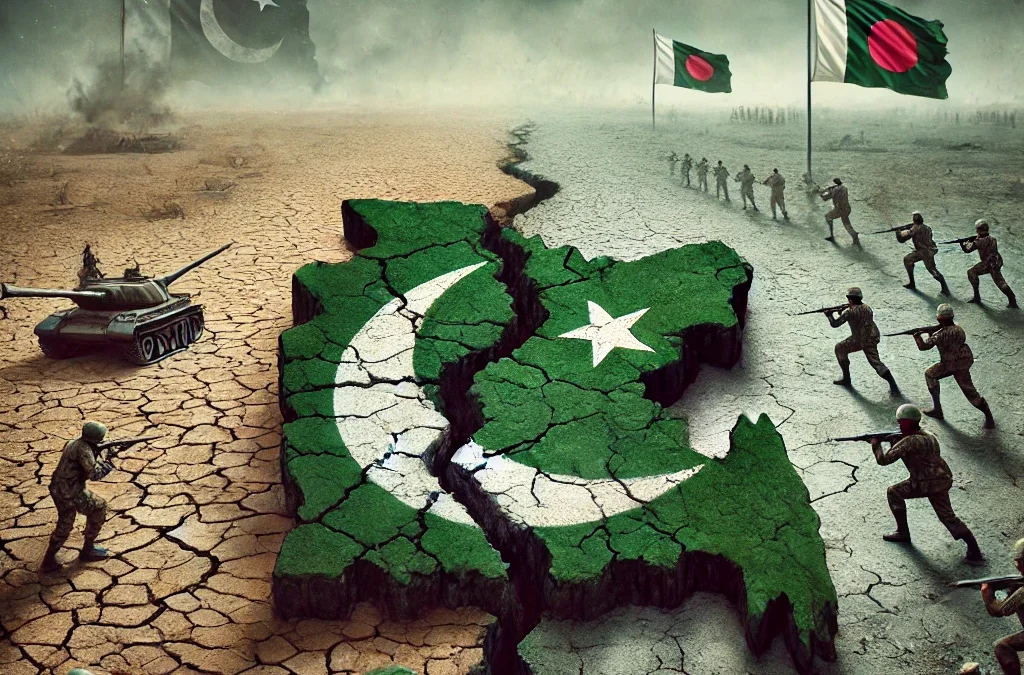In recent months, evidence has emerged suggesting Pakistan’s renewed efforts to influence neo-Islamist groups in Bangladesh. This strategy appears aimed at destabilizing India’s northeastern states—collectively known as the “Seven Sisters”—by fostering cross-border terrorism. Such actions not only threaten regional peace and economic growth but also seem to reflect lingering resentments from Pakistan’s defeat in the 1971 Bangladesh Liberation War.
Historical Context: The 1971 Liberation War and Its Aftermath
The 1971 Bangladesh Liberation War marked a significant turning point in South Asian history. The conflict led to the secession of East Pakistan and the birth of Bangladesh. Pakistan’s military, along with allied Islamist militias like Al-Badr and Al-Shams, committed widespread atrocities during the war, including targeted killings of intellectuals and minorities.These groups, composed mainly of pro-Pakistan Islamists, aimed to suppress the Bengali independence movement.
The defeat in 1971 was a significant blow to Pakistan, leading to the loss of its eastern wing. This event has continued to influence Pakistan’s geopolitical strategies, particularly concerning India and Bangladesh.
Pakistan’s Deep State and Its Strategic Calculations
Pakistan’s “deep state,” a term often used to describe the powerful nexus between its military and intelligence services, notably the Inter-Services Intelligence (ISI), has historically played a pivotal role in shaping the country’s foreign and security policies. The ISI has been implicated in supporting various militant groups to further Pakistan’s strategic interests, especially against India.
One such strategy is the “Bleed India with a Thousand Cuts” doctrine, which involves supporting insurgencies and militant activities to destabilize India over time without engaging in direct military confrontation. This approach has been evident in regions like Jammu and Kashmir and is now seemingly extending towards India’s northeastern states.
Reviving Ties with Bangladeshi Islamist Outfits
In Bangladesh, Islamist political parties like Jamaat-e-Islami have had historical connections with Pakistan. During the 1971 war, Jamaat-e-Islami opposed Bangladesh’s independence and collaborated with Pakistani forces. In recent years, there have been indications of Pakistan attempting to rekindle relationships with such groups.
For instance, the arrest of Ataullah Abu Ammar Jununi, the commander of the Arakan Rohingya Salvation Army (ARSA), in Bangladesh highlights potential links. Jununi, a Pakistani-born Rohingya, allegedly received militant training in Pakistan and possibly Afghanistan. While ARSA primarily operates in Myanmar, its activities have implications for regional security, including Bangladesh and India’s northeastern states.
Implications for India’s Northeastern States
India’s northeastern region, comprising the Seven Sisters—Arunachal Pradesh, Assam, Manipur, Meghalaya, Mizoram, Nagaland, and Tripura—has been a hotspot for various insurgencies. These movements, often rooted in ethnic and political grievances, have occasionally received external support.
Historically, insurgent groups like the Mizo National Front (MNF) sought assistance from external actors, including Pakistan, to further their causes. The MNF’s uprising in the 1960s and 70s saw attempts to secure support from Pakistan, highlighting the external dimensions of these insurgencies.
The revival of Pakistan’s ties with Bangladeshi Islamist groups raises concerns about a renewed push to destabilize India’s northeast. By leveraging these groups, Pakistan’s deep state aims to create a corridor of instability, facilitating cross-border terrorism and hindering economic development in the region.
Economic Ramifications
The northeastern states have witnessed significant economic growth in recent years, with improvements in infrastructure, tourism, and local industries. However, the resurgence of insurgency and terrorism could reverse these gains. Investors are often wary of unstable regions, and persistent violence can lead to capital flight, unemployment, and a slowdown in development projects.
Moreover, the strategic location of the northeast, serving as India’s gateway to Southeast Asia, means that instability here can have broader economic implications for regional trade and connectivity initiatives.
Diplomatic Perspectives
Internationally, there is growing recognition of the challenges posed by state-sponsored terrorism. Former U.S. Secretary of State Condoleezza Rice once remarked, “No cause, no movement, and no grievance can justify the intentional killing of innocent civilians and noncombatants.” This sentiment underscores the global consensus against using terrorism as a policy tool.
Furthermore, the U.S. State Department’s Country Reports on Terrorism have highlighted concerns about terrorist activities in South Asia, emphasising the need for regional cooperation to combat these threats.
For nearly 16 years, Pakistan’s intelligence outreach in Bangladesh appeared subdued. Following the crackdown on Jamaat-e-Islami and the 2013 Shahbagh protests that called for justice against war criminals of 1971, the Hasina-led Awami League took a firm stance against Islamist elements with historical ties to Pakistan. Dhaka’s internal security agencies, with strong public backing, curtailed many Islamist networks and politically marginalized those with explicit pro-Pakistan leanings. As a result, Islamabad found itself diplomatically and ideologically sidelined from Dhaka’s power corridors.
However, that vacuum seems to be fading—and fast.
In recent years, cracks have begun to appear. A neo-Islamist resurgence is quietly brewing among Bangladesh’s student population. While not mainstream yet, factions within student bodies have begun reactivating ideological narratives once buried: pan-Islamism, anti-India rhetoric, and a revisionist view of the 1971 Liberation War. These undercurrents are being amplified in digital spaces and mosques, and they’ve started finding sympathizers among former members of the military establishment.
The Bangladesh Army, long a powerful player in the country’s politics, has factions within its retired officer corps who are ideologically aligned with Pakistan. Some of these ex-officers view India with suspicion and are critical of Sheikh Hasina’s closeness to Delhi. Their worldview aligns with narratives that position Bangladesh not as an independent regional actor but as a potential node in a broader Islamic unity, often influenced by Pakistani strategic thought. This subtle ideological tilt emboldens military assertiveness and increases the Army’s appetite to influence policymaking in Dhaka, sometimes through soft power and sometimes through backchannel lobbying.
It is this alignment—a rising neo-Islamist student voice coupled with a reassertive, ideologically-inclined ex-military elite—that creates fertile ground for Pakistan’s deep state to re-enter the scene. Islamabad no longer needs a full-spectrum diplomatic reset; it merely needs ideological openings to insert influence. These new developments offer just that. By rekindling ties with sympathetic nodes in Dhaka—through Islamist student networks and retired officers—Pakistan finds a way to reintroduce its strategic calculus into Bangladesh’s domestic affairs.
The objectives remain familiar: delegitimize pro-India narratives, create pressure on Hasina’s government, revive anti-India sentiment, and build ideological footholds that can be leveraged to influence policy and security outcomes. The broader aim is to destabilize the India-Bangladesh bond and create a platform to revive cross-border insurgencies in India’s northeast. Pakistan’s goal isn’t merely mischief-making; it’s about altering the strategic balance in South Asia by reopening a once-closed front.
This recalibrated influence campaign also signals that Pakistan is trying to reverse its 1971 humiliation—not through war, but through ideological subversion. The psychological component is crucial: by embedding its presence inside Bangladesh’s security-military apparatus and shaping the minds of the next generation of Islamist leaders, Islamabad aims for a long-term strategic reversal.
In this way, Pakistan’s re-emergence is not a sudden flare-up but a carefully nurtured return—subtle, strategic, and deeply rooted in ideology.
Conclusion
Pakistan’s renewed attempts to infiltrate Bangladesh’s neo-Islamist circles and influence internal dynamics signal a broader, calculated strategy. These moves are not isolated incidents but part of a long game—designed to undermine regional stability, weaken India’s eastern frontier, and claw back influence in a country that decisively rejected Pakistani control in 1971. By aligning with ideologically sympathetic Islamist factions and leveraging dormant pro-Pakistan sentiments within parts of Bangladesh’s retired military elite, Islamabad is playing from its old covert playbook—with updated tactics.
What makes this resurgence particularly concerning is the timing. Bangladesh is at a crucial juncture, economically rising and diplomatically active, with growing strategic ties to India, Japan, and the West. Any destabilization now could derail not just growth, but the very fabric of secular, democratic governance that has kept extremist narratives at bay. Pakistan, through its deep state and strategic proxies, sees an opportunity to muddy the waters—eroding India-Bangladesh ties and reviving insurgency corridors in the Northeast.
But what makes the situation even more volatile is the political environment within Bangladesh itself. It’s ironic—almost tragic—that so many politicians in Dhaka treat politics as nothing more than a ruthless power game. They aren’t in it for vision, for reforms, or for national strength. Many are in it solely to grab power, by any means necessary. And in their mad scramble for the chair, they’re willing to kiss any frog that might accelerate their rise—even if that frog croaks in Urdu. This desperation creates dangerous openings for foreign actors like Pakistan to exploit. Ideology and national memory take a backseat when ambition is in the driver’s seat.
And make no mistake: this isn’t just about geopolitics. It’s personal for Pakistan’s establishment. The 1971 defeat still lingers as a historic scar—a national humiliation marked by the surrender of 93,000 Pakistani troops. This infiltration is not just strategic; it’s psychological. It’s about reversing the legacy of that surrender, not by winning a war on the battlefield, but by waging a silent war through ideology, influence, and infiltration. Pakistan’s re-emergence is not a sudden flare-up but a carefully nurtured return—subtle, strategic, and deeply rooted in ideology.






